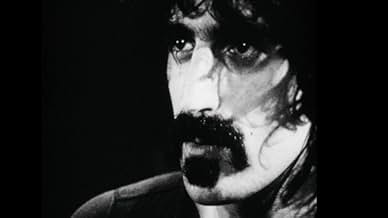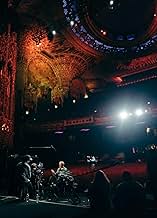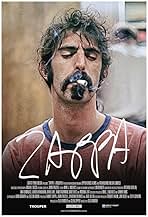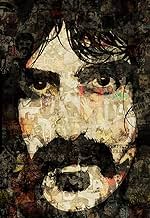IMDb-BEWERTUNG
7,5/10
3873
IHRE BEWERTUNG
Ein vertiefter Einblick in das Leben und Werk des Musikers Frank Zappa.Ein vertiefter Einblick in das Leben und Werk des Musikers Frank Zappa.Ein vertiefter Einblick in das Leben und Werk des Musikers Frank Zappa.
- Auszeichnungen
- 5 Nominierungen insgesamt
Frank Zappa
- Self
- (Archivfilmmaterial)
Lonnie Lardner
- Self - Newscaster for Action News
- (Archivfilmmaterial)
Patrice Zappa
- Self - Frank Zappa's Sister
- (Archivfilmmaterial)
Carl Zappa
- Self - Frank Zappa's Brother
- (Archivfilmmaterial)
Rose Zappa
- Self - Frank Zappa's Mother
- (Archivfilmmaterial)
Francis Zappa
- Self - Frank Zappa's Father
- (Archivfilmmaterial)
Edgard Varèse
- Self
- (Archivfilmmaterial)
Don Van Vliet
- Self
- (Archivfilmmaterial)
- (as Captain Beefheart)
Frank Zappa and the Mothers of Invention
- Themselves
- (Archivfilmmaterial)
Johnny 'Guitar' Watson
- Self
- (Archivfilmmaterial)
The Beatles
- Themselves
- (Archivfilmmaterial)
Tom Wilson
- Self - Music Producer
- (Archivfilmmaterial)
Euclid James 'Motorhead' Sherwood
- Self - Baritone Saxophone
- (Archivfilmmaterial)
- (as Motorhead Sherwood)
- …
Empfohlene Bewertungen
I gave this my own title because I feel that was the focus. And it's very well done! This movie gives you the full spectrum of Frank Zappa. It doesn't sugar coat the subject. While showing his brilliance it shows his flaws. The parts dealing with his end of life can be very emotional as it should be. Considering the vast volume of source material I was hoping for more of the Garrick Theater era, but it wasn't to be. Perhaps it's not available. Maybe some longer clips of concert material too. But it isn't that type of film. Hopefully everyone will see just how talented and driven Frank Zappa is from watching this. Alex Winter does a great job of showing his talent as a composer. Only lacking in showing what a proficient guitar player he was. Never really emphasized how ground breaking he was in that area. I still highly recommend seeing the movie!
I have been a lover of Frank Zappa's music since the late 70's. In the Fall of 1977, a friend asked me if I had ever listened to Frank Zappa, and I responded with disgust, relating to him the (false) urban legend of Zappa winning a "gross-out" contest with Alice Cooper by eating one of Cooper's own fresh turds on-stage. Without another word, my friend jumped up and put an album on - I didn't see (or ask) what album it was. After the first minute or so of music, I was really digging it, so I asked my friend who the artist was. "Frank Zappa," he replied (the album was "Roxy and Elsewhere," the side with "Village of the Sun" on it).
I was transfixed - I spent the rest of the afternoon in my friend's dorm room, cutting classes and going through my friend's Zappa albums. I have been a "Zappacolyte" ever since.
Winter's documentary offers a view of Frank Zappa as seen "from behind the curtain." There are loads of interviews with Frank, but also with Gail Zappa and with many members of Frank's bands over the years, as well as with friends and associates (for example, Alice Cooper appears in the movie). I found the interviews of Ruth Underwood and Steve Vai particularly insightful and touching. Along with the interviews, a huge treasure trove of footage is presented which is edited and spliced perfectly with the voice-overs.
Thankfully, Winter worked extra-hard to show us the "real" Frank Zappa. To do anything less would've allowed the movie to descend into a hagiography that would've been the ultimate insult to the memory of a unique genius like Frank.
"Zappa" starts somewhat slowly and perhaps a little pedantically, but this helps to lay the foundation for the presentation of Frank's later years. By the end, I had tears in my eyes as Winter's biography culminated in a heartfelt yet "open-eyed" tribute to one of the greatest musicians, composers, and spokesmen of our time.
I was transfixed - I spent the rest of the afternoon in my friend's dorm room, cutting classes and going through my friend's Zappa albums. I have been a "Zappacolyte" ever since.
Winter's documentary offers a view of Frank Zappa as seen "from behind the curtain." There are loads of interviews with Frank, but also with Gail Zappa and with many members of Frank's bands over the years, as well as with friends and associates (for example, Alice Cooper appears in the movie). I found the interviews of Ruth Underwood and Steve Vai particularly insightful and touching. Along with the interviews, a huge treasure trove of footage is presented which is edited and spliced perfectly with the voice-overs.
Thankfully, Winter worked extra-hard to show us the "real" Frank Zappa. To do anything less would've allowed the movie to descend into a hagiography that would've been the ultimate insult to the memory of a unique genius like Frank.
"Zappa" starts somewhat slowly and perhaps a little pedantically, but this helps to lay the foundation for the presentation of Frank's later years. By the end, I had tears in my eyes as Winter's biography culminated in a heartfelt yet "open-eyed" tribute to one of the greatest musicians, composers, and spokesmen of our time.
Greetings again from the darkness. Frank Zappa's music was never considered mainstream. His songs were rarely played on the radio. In his entire career, he charted one Top 40 song, and that was driven by his daughter. To some, he was known as a political activist and a spokesperson first, and a musician second. At times he was an enigma and a rebel or maverick, and he's even described as trying not to write a hit song. Alex Winter may be best known as Bill in the "Bill and Ted" movies, and he's also a successful documentary filmmaker (DEEP WEB, 2015). This time out he turns his focus on the career and life of Frank Zappa.
One of the first things we see is Frank Zappa taking us on a tour of his personal vault located at his Laurel Canyon home. It's an enormous private collection that captures quite a bit of history from the 1960's forward. Zappa points out some of his favorites including his jams with Eric Clapton in the basement and music with his friend Captain Beefheart (Don Van Vliet). These are original masters of Zappa's work over the decades, and he was nothing if not prolific, releasing 62 albums during his career, and another 53 following his death in 1993.
Acting as bookends for the film are clips of Zappa's 1991 live show in Prague, where he is helping celebrate the withdrawal of Russian troops. It's also his last guitar performance on stage. An incredible amount of footage exists of Zappa pontificating on one subject or another, sometimes on television, sometimes in front of news cameras, and even in front of a Senate committee. His music and his life was usually focused on social commentary, opinions not always popular with the establishment.
It's very interesting to hear Zappa talk about his early influences, particularly how he never outgrew his love for editing - something that began with the 8mm films at his childhood homes. He didn't begin playing music until his early teenage years, and it was orchestral before rock. He always considered himself a composer, and what a prolific writer he was. It's an unusual film in that it not only tracks the timeline of his career, but we are privileged to hear Zappa's opinions directly from him thanks to the unending recordings and archival footage available.
Mr. Winter includes much more than Zappa. We hear from musicians that made up the Mothers of Invention, including Steve Vai, Bunk Gardner, Ian Underwood, and an emotional Ruth Underwood. We also hear from renowned Rock n Roll groupie Pamela Des Barres, and Frank's wife Gail. It's noted that Zappa disbanded the Mothers of Invention in 1969, and there were many iterations that played afterwards. Some of the prominent names included violinist Jean Luc Ponty, and Howard Kaylan and Marc Volman of The Turtles fame. There is even a terrific clip of John Lennon and Yoko Ono performing on stage with Zappa and his band ... shocking for anyone not familiar with Yoko's infamous primal screams.
One of the best stories included is how Zappa's biggest hit came to be. A note from his young daughter, Moon Unit, introducing herself to her frequently absent father led to a collaboration on the single "Valley Girl", which cracked the Top 40. There are also stories on his dreaded hosting of "Saturday Night Live", as well as pieces on the Kronos Quartet, London Symphony Orchestra, and Ensemble Modern performing his music. In 1979, Zappa became the first musician to go completely independent with his own label, and this is only a few years after he was seriously injured by being attacked on stage.
Some may recall Zappa's appearance in front of the Senate committee in regards to the drive to include Parental warning labels on published music. Zappa viewed this as nothing more than censorship, and he was one of the few musicians to fight the battle against the opponents led by the wife of White House Chief of Staff James Baker. Zappa was certainly a man of principles, and had no time for those who weren't. It was pancreatic cancer that took his life, but a life well lived it was. His time as a symbol of freedom in Czechoslovakia is proof that he never shied away from standing up for what he believed in. So like his music or not - he surely didn't care. But he respected those who cared for society and freedom. Filmmaker Winter does a nice job with a two hour run time, when the material exists for a 4 part series.
One of the first things we see is Frank Zappa taking us on a tour of his personal vault located at his Laurel Canyon home. It's an enormous private collection that captures quite a bit of history from the 1960's forward. Zappa points out some of his favorites including his jams with Eric Clapton in the basement and music with his friend Captain Beefheart (Don Van Vliet). These are original masters of Zappa's work over the decades, and he was nothing if not prolific, releasing 62 albums during his career, and another 53 following his death in 1993.
Acting as bookends for the film are clips of Zappa's 1991 live show in Prague, where he is helping celebrate the withdrawal of Russian troops. It's also his last guitar performance on stage. An incredible amount of footage exists of Zappa pontificating on one subject or another, sometimes on television, sometimes in front of news cameras, and even in front of a Senate committee. His music and his life was usually focused on social commentary, opinions not always popular with the establishment.
It's very interesting to hear Zappa talk about his early influences, particularly how he never outgrew his love for editing - something that began with the 8mm films at his childhood homes. He didn't begin playing music until his early teenage years, and it was orchestral before rock. He always considered himself a composer, and what a prolific writer he was. It's an unusual film in that it not only tracks the timeline of his career, but we are privileged to hear Zappa's opinions directly from him thanks to the unending recordings and archival footage available.
Mr. Winter includes much more than Zappa. We hear from musicians that made up the Mothers of Invention, including Steve Vai, Bunk Gardner, Ian Underwood, and an emotional Ruth Underwood. We also hear from renowned Rock n Roll groupie Pamela Des Barres, and Frank's wife Gail. It's noted that Zappa disbanded the Mothers of Invention in 1969, and there were many iterations that played afterwards. Some of the prominent names included violinist Jean Luc Ponty, and Howard Kaylan and Marc Volman of The Turtles fame. There is even a terrific clip of John Lennon and Yoko Ono performing on stage with Zappa and his band ... shocking for anyone not familiar with Yoko's infamous primal screams.
One of the best stories included is how Zappa's biggest hit came to be. A note from his young daughter, Moon Unit, introducing herself to her frequently absent father led to a collaboration on the single "Valley Girl", which cracked the Top 40. There are also stories on his dreaded hosting of "Saturday Night Live", as well as pieces on the Kronos Quartet, London Symphony Orchestra, and Ensemble Modern performing his music. In 1979, Zappa became the first musician to go completely independent with his own label, and this is only a few years after he was seriously injured by being attacked on stage.
Some may recall Zappa's appearance in front of the Senate committee in regards to the drive to include Parental warning labels on published music. Zappa viewed this as nothing more than censorship, and he was one of the few musicians to fight the battle against the opponents led by the wife of White House Chief of Staff James Baker. Zappa was certainly a man of principles, and had no time for those who weren't. It was pancreatic cancer that took his life, but a life well lived it was. His time as a symbol of freedom in Czechoslovakia is proof that he never shied away from standing up for what he believed in. So like his music or not - he surely didn't care. But he respected those who cared for society and freedom. Filmmaker Winter does a nice job with a two hour run time, when the material exists for a 4 part series.
Who doesn't like Frank Zappa? Probably quite a lot of people, but do they know Zappa, have they listened to his records? He's one of those divisive artists that I think a lot of people don't give enough time or respect to. Getting into Zappa is daunting. There are a lot of records, over a hundred (seriously). I've not heard them all but some can be quite... challenging. That for me sums up Zappa, challenging. If indeed he can be summed up at all. I suspect director Alex Winter (yes that one) has listened to them all and loves every one. A prolific recording artist, targeting politics, social issues, pretty much anything he tuned his brain to, he's an interesting guy. Musically he was all over the shop, but it's the scale of Zappa's output that's, well... quite daunting. This doc tells Franks life in his own words. Thanks in large to an incredible self curated archive that Frank introduces us to. Recording masters, photos, videos, all labelled on shelves. I like Franks dedication to his work. Considering it's scope, there's an amazing clarity and focus to it. Inspired by Edgar Varèse as a teen, he's drawn to the weirder side of music, alongside some rhythm and blues. Self taught on the guitar and pretty much everything else, Zappa wasn't constrained by rules. It's a dizzying trip, there's a lot going on in Franks early life. Scoring b-movies, illustrating greetings cards, buying an old studio, seriously don't blink or you'll miss some interesting detail that makes up the fabric of the man. 1965, The Mothers of Invention are born and this is probably the beginning of how most people identify Zappa. He's he's the source at the centre of the band, of everything really. A workaholic perfectionist. Uncompromising and not afraid to go against the grain, piss people off and generally be very demanding. It was a trippy time in California though and there was an audience for Zappa's far out experimentation. An articulate composer creating undefinable music, whilst also keeping an eye on the business side of the industry. Zappa was savvy. Perhaps a control freak, but a capable one. There's a real sense that Frank was the most capable in any room he put himself in. Genius might not be a ridiculous word by any stretch. The centre of the music scene in West Coast America, he's the artist that others want to be and be with. The Stones, Beatles, Clapton, Bowie, Alice Cooper all get a mention... oh and Charles Manson. He's not concerned with success, with hits, just expression. Be it through music, animation, theatre or perhaps most of all, everything together at once. This covers Zappa's dizzying life remarkably well. Never getting too bogged down in any one place and although it's the albums that make him (in)famous, there's a ton of fantastic live footage to enjoy here. If you're not a fan, it probably won't convert you, but I think will give you an appreciation to a genuinely interesting musical icon. A serious man, realistic, artistic, funny, principled and political. Winter has done him justice.
As a backer of the vault saving project which lead to this movie, and a long time Zappa fan I have read 'The Real Frank Zappa' book and many other articles, clips, etc. throughout his life so maybe I'm coming from a different viewpoint than the average viewer.
There is a lot of new footage and a few new things to be learnt about his life but there are many moments in the movie where I feel that the details are left out just a little too much - for example Frank worked for Studio Z before he bought it - he also bought up film sets with expectation of making movies.
I would have loved to have seen/heard more about his younger life, and the Garrick theater shenanigans, etc.
Otherwise the movie is beautifully made..
There is a lot of new footage and a few new things to be learnt about his life but there are many moments in the movie where I feel that the details are left out just a little too much - for example Frank worked for Studio Z before he bought it - he also bought up film sets with expectation of making movies.
I would have loved to have seen/heard more about his younger life, and the Garrick theater shenanigans, etc.
Otherwise the movie is beautifully made..
Wusstest du schon
- WissenswertesThe film was not financed by crowdfunding, contrary to popular belief. The Kickstarter campaign was aimed solely at preserving and restoring the contents of the Zappa vault. The film that resulted from that preservation was itself financed by conventional backers.
- PatzerIn the opening titles, it says, Zappa played a concert in the Czech Republic on 24 June 1991, to celebrate the fairly recent departure of Russian troops. It was in fact still Czechoslovakia then.
It then incorrectly states that this was his last recorded guitar performance, but that was in fact one week later at a smaller concert in Budapest.
- Zitate
Ruth Underwood: It was that type of music that he could produce that was a product of everything that was in him. But you couldn't really categorize it. You couldn't say, Oh yeah, that's rock and roll, 'cause it wasn't.
Ruth Underwood: It's jazz. No. It really wasn't. It's pop music. No. Not at all. Well, what the hell is it?
Ruth Underwood: It's Zappa.
- VerbindungenFeatures The Ernie Kovacs Show (1952)
- SoundtracksBolero
Written by Maurice Ravel
Top-Auswahl
Melde dich zum Bewerten an und greife auf die Watchlist für personalisierte Empfehlungen zu.
- How long is Zappa?Powered by Alexa
- How will I be able to watch this?
Details
Box Office
- Bruttoertrag in den USA und Kanada
- 15.502 $
- Eröffnungswochenende in den USA und in Kanada
- 2.019 $
- 29. Nov. 2020
- Weltweiter Bruttoertrag
- 220.031 $
- Laufzeit2 Stunden 9 Minuten
- Farbe
- Sound-Mix
- Seitenverhältnis
- 1.33 : 1
- 1.78 : 1
Zu dieser Seite beitragen
Bearbeitung vorschlagen oder fehlenden Inhalt hinzufügen




























